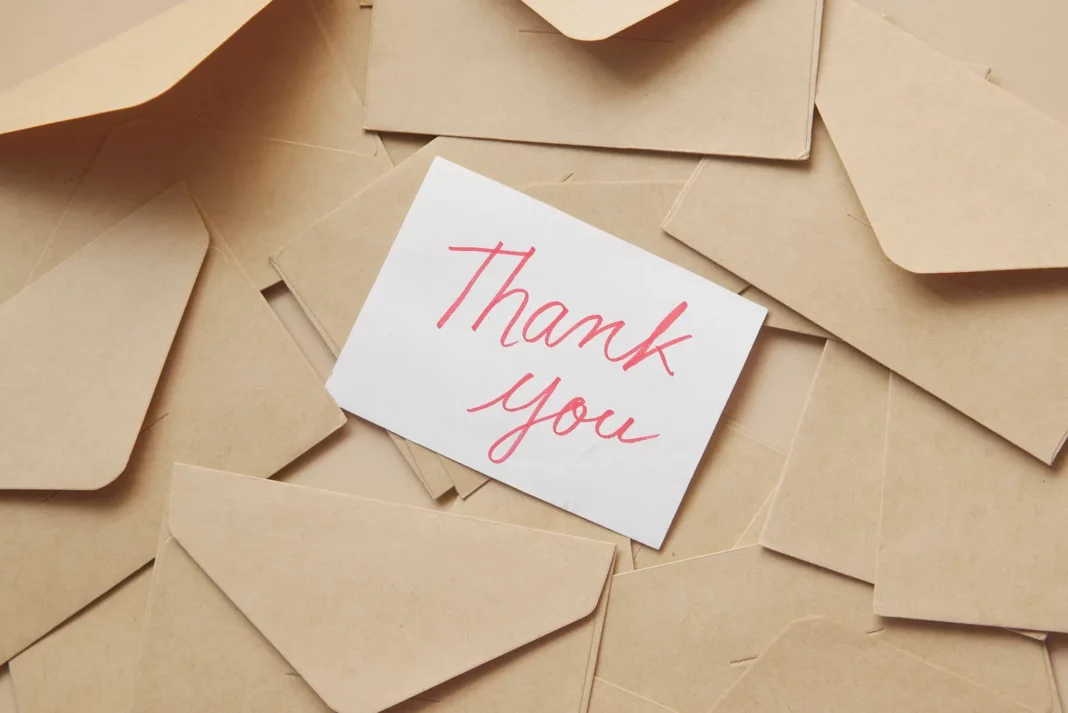Before my kids could even talk, I was telling them to say thank you. I must have sounded like a broken record.
🗣️ Say thank you to Daddy for the bedtime story.
🗣️ Say thank you to Aunt Serena for the winged pajamas.
🗣️ Say thank you to Charlie for bringing your bottle.
It’s a small wonder that they didn’t rise up out of their cribs and try to shove one of their stuffed animals in my mouth to keep me quiet.
In addition to having good manners, I hoped they would internalize the importance of expressing gratitude. It took me a while to realize that there is a vast gap between mindlessly uttering the words “thank you” and actually being grateful.
Alas, mindless gratitude is not gratitude at all. When saying “thank you” becomes an automatic response to thankless interactions like a police officer handing you an undeserved parking ticket or a telemarketer interrupting dinner, you know it’s an empty phrase. Not so long ago, I caught myself thanking Amazon’s Alexa for giving me the weather. For the record, she did respond, “you’re welcome.”
How can we make gratitude a habit without it becoming habituated? How can we raise grateful children? How do we express genuine gratitude for a present? Psychologist Andrea Hussong from the University of North Carolina Chapel Hill explores gratitude beyond good manners. In an interview with the Harvard School of Education, she describes a strategy to help boost gratitude and that may be especially useful for anyone who struggles with writing thank you notes.
According to Hussong, the key is to look for the gift beyond the gift. Rather than focusing on the actual object, consider what the giver’s intention was. Reflect on the effort and thoughtfulness that went into it. Hussong’s work focuses primarily on children but has applications for us all.
Here is Hussong describing the process for finding the gift behind the gift:
I know that my aunt gave me that sweater, and it’s got butterflies on it, and she knows I like butterflies. So the gift wasn’t just the sweater. It was that she was thinking about me, and that this was for me. And the more you’re sort of in touch with that intention that someone else has for giving you, the more it feels good and personal. And it’s not about the sweater anymore. It’s about your connection.
There is a lot more to gratitude than being thankful for what you have been given. In a Harvard Business Review article, “Stop Making Gratitude All About You,” Professor Heidi Grant Halvorson captures what so many of us get wrong about gratitude:
Recent research suggests that people often make a critical mistake when expressing gratitude: They focus on how they feel — how happy they are, how they have benefitted from the help — rather than focusing on the benefactor.
Halvorson’s research found that those who expressed gratitude towards another person had stronger and more loving relationships than those who focused on the benefits to themselves. In other words, if your partner sends you flowers today, you can think to yourself about how receiving flowers makes you really happy or you can channel your inner gratitude towards your partner by actively saying or doing something that acknowledges how awesome your partner is.
Many people keep gratitude to themselves. They feel it but don’t express it. They assume the other person already knows how much they are appreciated or they worry about finding the right words to say what they want to say.
Putting pen to paper or sending a thank you email may seem unnecessary or feel awkward but it’s definitely worth it. According to a recent study, we systematically underestimate how uncomfortable expressions of gratitude might make someone feel. Misunderstanding the consequences of saying thanks keeps us from engaging in a simple action that would make us and someone else a little happier. The conclusion of a study is crystal clear: every time we don’t express gratitude, we are missing an opportunity to give others and ourselves a boost.
Gertrude Stein famously said, “Silent gratitude isn’t very much to anyone.” She was right. Say it. Write it. Express it somehow. Whatever you do, please don’t keep it to yourself.
I wish you all the best,
Dr. Samantha Boardman






